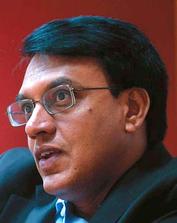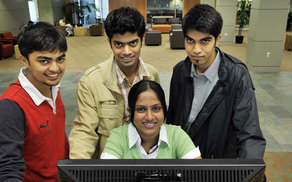 People who are not familiar with the job market in India are often unaware of the "employability issue" specifically in the IT industry. Working with technical women in India since 2008, I am often asked to help female students find employment when they graduate. This is not surprising, as I have helped many young women in the United States find their first employer. What surprises me more is the response I often received from my hiring contacts in India: "I am sorry, but she doesn't meet the criteria" or "We can't help her. She doesn't meet the basic standards we require." How could this be? These women have bachelor’s degrees in computer science. Read on...  The numbers vary, but approximately 820,000 pursue technical degrees each year in India. Between 60-80% of all engineering graduates in India are "not employable" (depending on which report you adopt)-- meaning they lack the basic skills and education required to land their first job in industry. This means there are between 492,000 and 656,000 engineering and technology graduates each year who want a technical career in India and cannot reach their goal. Regardless of which report your subscribe to, let's agree, it's a really big number, and a big problem for the technology industry and for the future of India. Students from the top tier schools such as IITs don't have this problem. These institutions’ curriculum has been supplemented by significant investments to prepare their students for industry. Tier 1 schools also provide the resources and industry partnerships to make their students successful. Many second tier institutions also have higher rates of employability, leveraging similar resources. However, most schools in India don't hold themselves to these standards and the government doesn't require them to do so - there is no "accreditation" process and no transparency or accountability for the success rates of graduating students. The reality is unless you graduate from very specific schools (and each hiring company in industry uses their own list) the odds are against you ever landing that first job, but they don’t tell you that when you enroll. I hear many stories from parents, often with very modest incomes, spending every last rupee (sometimes borrowing the money) to get their daughter into engineering school. When she has finally graduated, often the first one in her family to earn a higher education degree, she can't find work. She is desperate because she is expected to support her family and is told "there is nothing you can do." Why would parents invest in sending her to a school if she will not find employment when she graduates? Because they don't know about it. More on this later...  Srikantan Moorthy Here is the perplexing part -- no one is doing much about it. Curriculum for most institutions is stuck in a time warp: a faculty described to me how one chapter of the standard curriculum she has to use describes the technical configuration of a rotary phone. There are few collaborations between industry and academia on research and curriculum, and employment outcomes have become the "third rail": no one wants to touch it. There are many people who write about the problem like Dr. G.R. Sinha, Professor and Head (IT), Shri Shankaracharya College of Engineering and Technology, Bhilai. Srikantan Moorthy from Infosys who talks about the 23-week program Infosys provides to "Freshers" (new recruits) to bring them up to speed (less than 20% of those who qualify to be tested for this program are considered for employment at Infosys). In the state of Kerala alone, there are over 3500 engineering colleges - most have launched in the last 10 years with no regulation and over site and no public reporting of employment rates upon graduation. Colleges are sprouting up on every block.  No one talks about the fact that this is also an issue of gender inequality. For young women, the problem is worse. Why? Because women only make up 7-8% of college graduates in Computer Science in Tier 1 schools like IIT. Few girls get access to the kind of education and family support that is necessary to access the IITs. Most women are in the Tier 2 and Tier 3 levels where yes, they are often at 40-50% of the student population, but this is where the highest numbers of "not employable" graduates exist. There are a number of "finishing schools" where parents send their not-employable kids to learn the soft skills they missed in college, but for many young women I have worked with, this is not an option. Parents will not/can not invest in more training for the women after college. These finishing schools tell me their clients are mostly male, and I am not convinced many of these schools actually help.  In October 2011 I attended an event at TiE where Shri N Parthasarathi, the Indian Ambassador for the US newly based in San Francisco met with executives in Silicon Valley. I couldn't wait to ask him about employability. When the panel concluded, I asked him publicly what the government plans to do about this problem. Both he and one of the founders of TiE said:"the Government will do nothing. The market will bear the solution - it will eventually realize these schools are not making students employable and they will eventually go out of business." Other panelists agreed - these executives made it through school and if someone wants to succeed - they will figure out a way. No help from this group who should be invested in building the workforce of the future for India. What can be done? Can we allow this waste of talent to continue? India is not the only one with an employability problem, including the US, but the Indian numbers are shocking in relation to other countries. The Clinton Global Initiative has made employability a key focus this year and plans for programs for transformative skills for the global workforce. For now, what can or should be done in India? Interested in hearing your thoughts. In my next blog, I will cover the skills that are missing from the employability picture and discuss some potential solutions. Have you signed up for the Global Tech Women newsletter? Sign up here.
3 Comments
A woman can be employable. But the gender gap issues holds a woman back. Many of us think that men are more proficient than women. And this idiotic assumption makes it tougher for a woman to find a job in this corporate world. I honestly feel that this is entirely a pointless argument. Because from an economic perspective, if you want your zone to become financially rich, then first you need to mitigate the gender gap present in your surrounding. Different people have different viewpoints about women and work. But the one who is truly genius will never leave a capable woman for his technical and core sectors. Thanks for the enlightenment.
Reply
6/26/2018 09:55:39 pm
Ankitech do manufacture and supply all types of hospital bed like ICU Bed, ICCU Bed, Fowler Bed, Semi Folwer Bed, Electric Bed etc which are not only used in the hospitals but are used in other health care services and facilities, such as nursing homes, assisted living services, outpatient clinics, and in home health care services.
Reply
7/13/2018 12:31:05 am
Prestige packers and movers is one of the best private sector logistics company in India. Prestige packers and movers follow best practices in household and office movements. We are leader in providing packing and moving services to consumers and companies from more than 10 years.
Reply
Leave a Reply. |
|

 RSS Feed
RSS Feed